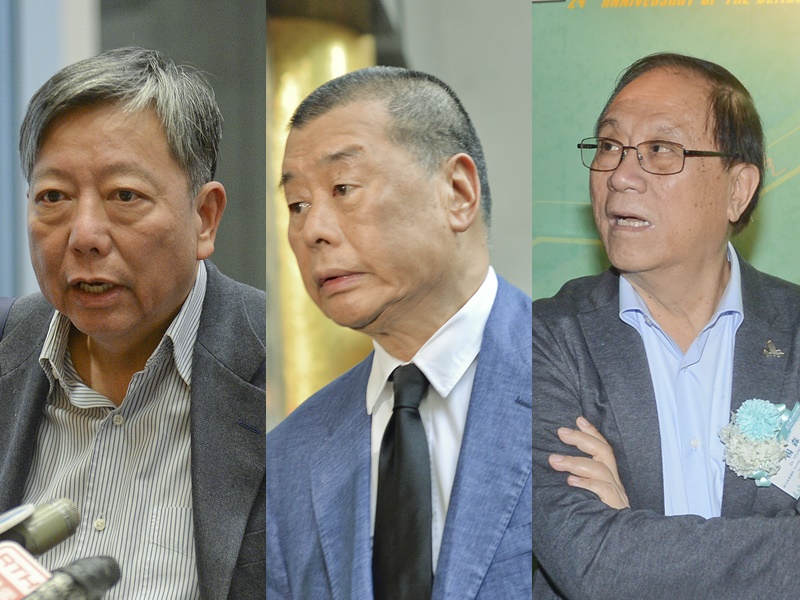Following the arrest on 28 February of at least three persons, the ICJ has called on the Hong Kong authorities to drop criminal charges of taking part in an “unauthorized assembly” against them and to reform the Public Order Ordinance in compliance with international human rights obligations.
On 28 February, Hong Kong police arrested publisher Jimmy Lai, the founder of Next Media, which publishes the Apple Daily newspaper, and two pro-democracy activists, Lee Cheuk-yan, the vice-chairman of the Labour Party, and Yeung Sum, a former chairman of the Democracy Party, for taking part in a march banned by police on 31 August 2019. The Police prohibited the march on the stated grounds that the Civil Human Rights Front could not guarantee the march would be peaceful and orderly, shifting responsibility of maintaining order to the organizer.
“We are extremely concerned about the way in which the unauthorized assembly provisions of the Public Order Ordinance has been used to silence lawful expressions of political opinion since the Umbrella Movement of 2014,” said Frederick Rawski, ICJ’s Asia Pacific Director. “These most recent arrests, made for allegedly participating in a largely peaceful protest more than six months ago, are part of a troubling pattern of bringing legal action to harass activists involved in peaceful acts of protest.”
The arrests were made pursuant to the Hong Kong SAR Public Order Ordinance (Cap. 245) Section 17A(3)(a). Under the ‘unauthorized assembly’ provisions of the law, every person who, without lawful authority or reasonable excuse, knowingly takes or continues to take part in or forms or continues to form part of any such unauthorized assembly is guilty of an offence and can be sentenced up to five years imprisonment.
The authorities have wide discretion to prohibit public meetings, and prosecute those who are alleged take part in them. These overbroad provisions have been used to restrict the proper exercise of free assembly and association rights – including onerous requirements to obtain a “notice of no objection” from the government for even small gathering under a threat of a maximum five years imprisonment for violations.
“The ICJ calls upon the Hong Kong SAR government to take measures to protect the right to peaceful assembly and create an environment in which people can safely express diverse ideas and dissenting voices – consistent with international legal obligations,” said Rawski. “This includes ensuring that the law is not used to harass pro-democracy activists and human rights defenders.”
The ICJ underscores that any restrictions to the right of peaceful assembly must be narrowly drawn to be permissible under international law. Restrictions are not permissible unless they have been provided by law, and are necessary and proportionate to a legitimate purpose enumerated in article 21 of the ICCPR, such as public order. However, imposing criminal charge on people exercising their right of peaceful assembly who fail to comply with a procedural requirement, such as notification, unduly restricts freedom of peaceful assembly by adding unnecessary barriers to public gatherings. Furthermore, the sentencing guidelines of the Ordinance, which include the possibility of a peaceful participant of a public assembly being sentenced to five years in prison if the organizers fail to comply with the notification requirement, are extreme, disproportionate and open to abuse.
Hong Kong SAR, though not the rest of the PRC, is legally bound by the ICCPR. Article 21 of the ICCPR and Article 27 of the Basic Law in Hong Kong both recognize and protect the right of peaceful assembly. The UN Human Rights Committee, the supervisory body responsible for the ICCPR and other UN independent authorities, have repeatedly urged the authorities to ensure that the Public Order Ordinance is implemented in conformity with Hong Kong’s obligations under the ICCPR.
To download the full statement with additional information, click here.
See also: Hong Kong: ensure police do not use excessive force against protesters
https://www.icj.org/hong-kong-ensure-police-do-not-use-excessive-force-against-protesters/
Contact:
Frederick Rawski, ICJ’s Asia Pacific Regional Director, t: +66 2 619 84 77; e: frederick.rawski(a)icj.org
Boram Jang, ICJ Legal Adviser, Asia & the Pacific Programme, e: boram.jang(a)icj.org




